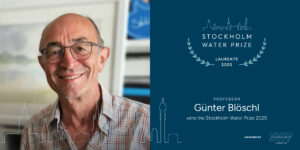In memoriam: world-renowned ecologist David Schindler
Professor David Schindler loved lakes and would spend much time in his canoe doing fieldwork. Through vigorous studies of samples of water, aquatic organisms, and sediment, he was able to prove how pollutants such as phosphate-based detergents and fertilizers were harming freshwater bodies. His findings and advocacy were instrumental to the eventual banning of phosphates in detergents in many countries.
Already in 1968, David Schindler set up the Experimental Lakes Project for Canada’s Department of Fisheries and Oceans and started to develop a new understanding of the threats to the country’s, and the world’s, freshwater. Under his leadership, the innovative project became one of the world’s most influential freshwater research facilities. Among the achievements that led to Professor Schindler receiving the first Stockholm Water Prize in 1991 can be mentioned that the project managed to confirm the cause of algal blooms in freshwater and describe the impact of acid rain on freshwater ecosystems.
Groundbreaking research
This was not only groundbreaking research but also paved the way for stricter controls on phosphates and acidifying pollutants such as sulphur dioxide. In recent years, David Schindler made important contributions to our understanding of freshwater shortages and climate change in northern boreal ecosystems.
The University of Alberta, where David Schindler was professor emeritus, writes in a tribute to his life and research, that he was one of the world’s strongest and most respected voices ensuring water safety and sustainability. In the article, he is cited describing the importance of water to a group of emerging scientists: “Water, my specialty, is perhaps the best index of what is happening, the canary in Earth’s coal mine.”
Teaching and advocacy
The university’s tribute especially acknowledges Professor Schindler’s passion for teaching and advocacy, something which was also highlighted when he received the Stockholm Water Prize in 1991. David Schindler understood the importance of communicating his research to a broader audience so that policymakers could act on it. Raising awareness among Canadians – for example through a famous photo of a lake impacted by phosphorus – made it possible to build public support for strong measures against eutrophication.
Through this combination of scientific achievements and determination to inspire change, David Schindler managed to influence the decision-makers of his day and inspire new generations.
“David Schindler was a remarkable scientist and a tireless advocate for water. He not only increased our understanding of emerging threats to freshwater systems but also demonstrated solutions that led to real change. At SIWI we were honoured to award him the first Stockholm Water Prize and remain eternally grateful for his numerous scientific contributions. Our thoughts are with his family,” SIWI’s Executive Director Torgny Holmgren says in a comment.








